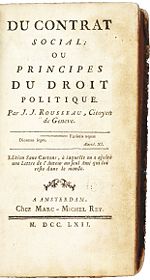Social Contract (Rousseau)

The Social Contract, Or Principles of Political Right (1762) by Jean-Jacques Rousseau, is the book in which Rousseau theorized about social contracts as the origins of political community i.e. civil society.
Like John Locke, who believed that a government can only be legitimate if it has been sanctioned by the people in the role of the sovereign, Rousseau claimed that a perfect society would be controlled by the "general will" of its populace. While he does not define exactly how this should be accomplished (as there are many possible ways, each suited to different situations), he suggests that assemblies be held in which every citizen can assist in determining the general will. Without this input from the people, there can be no legitimate government. Importantly, this input cannot come from representatives, but must be from the people themselves.
THE Sovereign, having no force other than the legislative power, acts only by means of the laws; and the laws being solely the authentic acts of the general will, the Sovereign cannot act save when the people is assembled.[2]
Every law the people has not ratified in person is null and void — is, in fact, not a law.[3]
The legislative power belongs to the people, and can belong to it alone.[4]
The Social Contract was a progressive work that helped inspire political reforms or revolutions in Europe, especially in France. The Social Contract finally expelled the myth that the King was appointed by God to legislate; as Rousseau asserts, only the people, in the form of the sovereign, have that all powerful right.
- The heart of the idea of the social contract may be stated simply: Each of us places his person and authority under the supreme direction of the general will, and the group receives each individual as an indivisible part of the whole...
Contents |
Overview
The stated aim of the Social Contract is to determine whether there can be a legitimate political authority. Mahatma Gandhi quoted from The Social Contract on numerous occasions during his speeches. Man is born free, yet everywhere he is in chains.[5] In order to accomplish more and remove himself from the state of nature, man must enter into a Social Contract with others. In this social contract, everyone will be free because all forfeit the same amount of freedom and impose the same duties on all. Rousseau also argues that it is illogical for a man to surrender his freedom for slavery; and so, the participants must be free. Furthermore, although the contract imposes new law, especially on property, a person can exit it at any time (except in a time of need, for this is desertion), and is again as free as when he was born.
Rousseau posits that any administration, whatever form it takes, should be divided into two parts. First, there must be the sovereign (which could be the whole population if that is the majority's desire) who represents the general will and is the legislative power within the state. The second division is that of the government, being distinct from the sovereign. This division must be since the sovereign cannot deal with particular matters (it is then acting as particular wills and not the general will — the sovereign is no longer whole and therefore ruined), like applications of the law. Therefore a government must be separate from that of the sovereign body.
Rousseau claims that the size of the territory to be governed often decides the nature of the government. Since a government is only as strong as the people, and this strength is absolute, the larger the territory the more strength the government must be able to exert over the populace. In his view, a monarchal government is able to wield the most power over the people since it has to devote less power to itself, while a democracy the least. In general, the larger the bureaucracy, the more power required for government discipline. Normally, this relationship requires the state to be an aristocracy or monarchy. In light of all this, Rousseau seems to prefer a benevolent Tyrant over any other form of leadership (including a true democracy); however, he remains obscure on this point.
See also
- Social contract; the more general concept
- classical republicanism
References
- ↑ R.A. Leigh, Unsolved Problems in the Bibliography of J.-J. Rousseau, Cambridge, 1990, plate 22.
- ↑ The Social Contract, Book III, Chapter 12:How the Sovereign Authority Maintains Itself.
- ↑ The Social Contract, Book III, Chapter 15:Deputies or Representatives.
- ↑ The Social Contract, Book III, Chapter 1:Government in General.
- ↑ The Social Contract, Book I, Chapter 1:The subject of Book I